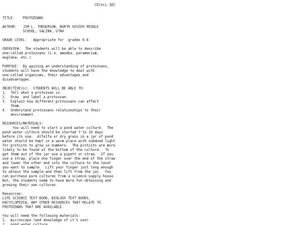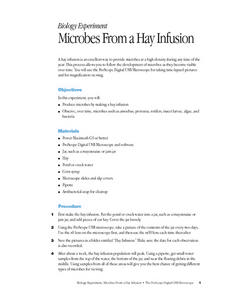Curated OER
Protozoans
Students examine protozoans and their advantages and disadvantages. In this chemistry lesson students explain what a protozoan is then draw and label one.
Curated OER
Microbes From a Hay Infusion
Students observe, over time, microbes such as amoebas, protozoa, rotifers and insect larva. They create a hay infusion culture using pond water then sample and record organisms found over a two week period.
Curated OER
PARAMECIUM RESPONSES TO STIMIULI
Students design the test they use to examine, how the paramecium move, feed, and react to different types of stimuli such as a drop of vinegar. They conduct a lab experiment using a microscope.
Curated OER
The Physiological Tolerance of Two Species of Protozoans
High schoolers examine the differences in pH tolerance between the two species and relate these differences to their respective niches.
Curated OER
Endosymbiosis: A Friend Within
Students research the ecological principle of symbiosis. Using a microscope, students observe the relationship of mutualism between termites and flagellates. Students examine a live termite and protozoans. They discuss the principles...
Curated OER
Composting in Schools: Observing Compost Microorganisms
Students explore composting. In this composting lesson, students use compound microscopes to observe the microbial communities in compost. Observations and documentation of changes will occur over the course of several weeks.
Curated OER
Comparative Embryology Using Japanese Medaka Fish
Young scholars conduct an experiment to control the breeding of Japanese Medaka fish. They collect the fertilized eggs and view and record the fish's embryological development daily to compare the stages to human development.








